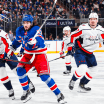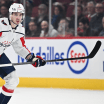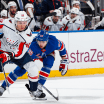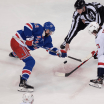The Song Is Familiar -As they get ready to host the Carolina Hurricanes in a pivotal Game 5 on Saturday night, the Capitals find themselves in familiar territory. This is the fifth time in its last six playoff series that Washington sits even after four games.
SKATE SHAVINGS - News and Notes from Caps' Morning Skate 4/20
Caps in familiar spot at 2-2, the importance of forecheck going forward in series, the need for secondary scoring, more
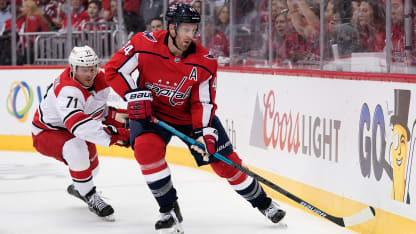
The Caps will be without right wing T.J. Oshie for an indefinite period of time after he suffered an upper body injury late in Game 4. Washington recalled winger Devante Smith-Pelly from AHL Hershey on Friday, and Smith-Pelly rejoined his Caps teammates at Saturday morning's skate.
"We understand what we went through last year; this is part of the experience," says Caps coach Todd Reirden. "We went through some difficult times last year, whether it was injuries or suspensions or being down in series - whether it was 0-2 or 3-2 in different series - and battling through some tough times. We managed as a group to come through it.
"Are we happy that that happened? No, and maybe that spurs us on to a different level of play, because we need a different level of play from everybody. [Carolina] pushed back, and now it's our turn to return the favor when they come into our building. We worked hard all year to have the opportunity to have home ice in this round, and now it's our chance to see it through."
The Caps came through each of the previous four 2-2 sets with series wins, and they'll be looking to draw from that experience as they return home for Game 5.
"The one thing you can go back on and look at, is it always happens a different way," says Reirden. "It always tells a different story, and different things happen throughout the course of a series. Now that this core group of players that we have has been through a number of them in different ways, that's the experience that we're hardened to from failures in the past, and we're privileged to have gotten through last year and had a positive experience as well.
"We'll rely on our veteran group as we have all year, to push us through and find the right combinations that give us a chance to win Game 5 here at home."
Todd Reirden | April 20
Four games into the series, the Caps have been rightfully complimentary of how well Carolina has played. They've also been rightfully critical of their own performance in the series, and talking about how they haven't reached "that other level" yet. There is no time better than the present to do so. Tonight, the Caps and Canes are playing for the right to be able to end the other team's season on Monday night in Raleigh when they meet again in Game 6.
"It doesn't matter how you get there," says Caps right win Tom Wilson. "It doesn't really matter at any point of the series. Each game has a lot of weight and has a lot of value. So these are pivotal games in the series, and we haven't played the hockey that we really want to yet, so it's a good time for it."
Dig For Fire - During their sprint to the Stanley Cup championship last spring, the Caps got a good amount of mileage from a stiff and consistent forecheck over two dozen playoff games. All four lines contributed to that cause in 2018, and Washington delivered more hits to opposing defensemen than opponents put on Caps' blueliners in each of its four series last spring.
That stout forecheck is an element that is notably and noticeably lacking for Washington in the first four games of this series. Carolina used a suffocating forecheck to win Game 3, and while the Caps adjusted well and were able to get out of their own end more cleanly and efficiently in Game 4, they obviously didn't win that game and their own forecheck is still pretty much non-existent.
"I don't think we've been as physical on our forecheck as we would have hoped, after four games of evaluating," admits Reirden. "Some of it is that we are not getting in enough to forecheck, and when we are we haven't been as physical as maybe we have been in past series and prior time."
Through four games in this series, the Caps have put a total of just 36 hits on Carolina defensemen, and Washington defensemen have been on the receiving end of 59 hits. The disparity in hits on defensemen and the Caps' league-worst 38.97 Corsi rating are good indicators of how Carolina has dominated that aspect of this series.
Of the 16 playoff teams this spring, no team has put fewer hits on the opposing defensemen than the Capitals, and their minus-23 disparity is second only to that of Pittsburgh (minus-28), which was swept away in four games by a similarly strong Islanders forecheck.
Making defenders pay the price on the forecheck is critical in a best-of-seven series, and the Caps have been extremely lax in making that important investment in this series. Washington was plus-52 in that metric in the 2018 Stanley Cup playoffs.
Getting Smith-Pelly into the lineup on the fourth line should help.
Devante Smith-Pelly | April 20
"It's been a while," says Smith-Pelly. "It's obviously been a year since I played in a playoff game. How I can help is just doing what I do, getting in on the forecheck, making it hard on their [defensemen]. They've got a lot of really good [defensemen], and I'm going to try to get the body on them so maybe they can't get into the play as much, and maybe offensively too, if the time comes."
"We have to continue to try and get pucks behind them," says Caps center Nic Dowd, who will be in the middle of Washington's fourth line with Chandler Stephenson and Smith-Pelly in Game 5. "It's tough. You put it there, and if you don't get their first, they're either rimming it or slapping it or chipping it, and it makes it difficult for us to get a forecheck going. And if not everyone is in the right spot at the exact time, the puck seems to find its way out and it becomes a neutral zone forecheck, or we have to dump it back in."
For many months now, Caps defenseman John Carlson has preached the importance of the night-in, night-out forechecking wars at both ends of the ice. For Carlson, that is often the most critical element in the results from night to night. It's more important during the playoffs when the effects are cumulative against the same opponent.
"I think it is real important in this series," says Carlson. "They are getting great commitment from everyone coming back. If you watch, we break the puck out and maybe in the regular season we would have a 3-on-2 or a 4-on-3. But when everyone is coming back as hard as they're coming back, it makes it difficult -unless you have a 2-on-1, really - to take your time and make a high skill play.
"So it might look like have 3-on-2s and 2-on-1s, but with the way that they're coming back, maybe it's more important to just get it deep. Maybe that will open them up that way as well."
In their own end, the Caps need to continue to execute, communicate and make good decisions with the puck. If they're going to have success in the offensive zone, it's going to start with dealing with Carolina's forecheck and being aware of potential chances for odd-man opportunities going north.
"On the breakouts," explains Carlson, "it's important to have support. And if they're going to be that aggressive down the walls with their [defensemen], they're always thinking of going forward. So when we can execute and make plays, we're going to get those looks. Plays like that will be there, but we have to be positionally sound. We have to be ready to have that battle with their [defense].
"So it's going to take a couple of different things to get those great looks, and we've just got to stick to the fundamentals of it all to make it possible."
Pregame Locker Room | April 20
Step It Up And Go - Four games into the series with Carolina, the Caps have scored nine goals, just one of them in the last two games. Three of Washington's goals have come on the power play, four have come off the rush, one was an empty-netter, and only one - Brooks Orpik's overtime game-winner in Game 2 - came as the result of sustained time in the offensive zone.
The Caps have also been top heavy in their attack; six of the nine goals have come from member of the team's top line. Oshie has one, Lars Eller scored the empty-netter, and then there's Orpik's goal.
"It's a seven-game series," says Caps winger Brett Connolly, "so you go a couple of games without scoring, you want to stop the bleeding as much as you can. But our team is going to need some of that moving forward here, if we're going to win series and go on a deep run. We know that, and we've proven it in the past. It's just a matter of getting it done. We've had some good shifts and we've had some not so good shifts. There is a lot on the line obviously, we just need to step up our game and play the way we know we can play. If we do that, we'll be fine."
Washington will take scoring where it can get it, obviously, but the team with seven 20-goal scorers during the regular season is in dire need of diversity in its attack. The Caps' bottom six forwards contributed 27 goals to the cause in 24 games last spring en route to a Stanley Cup championship, and they've accounted for only one in four games thus far this spring, Eller's empty-netter.
"It has been top heavy," says Reirden, "and just even five-on-five scoring is not where we need it to be, in particular the last two games. So we've got to find ways to generate offense.
"It's always tougher to create in the playoffs. Teams don't give up quite as much on the rush; they're a lot more committed to not giving up odd-man rushes to the opposition. We've got to find a way to get in on the forecheck more and impose a little bit more of a physical style of play on their defense, and that comes with our puck management and putting pucks in behind them. And then when we have space, we've got to use it. That's been a recipe for us that has been successful in the past, and then we start to get some offensive zone time and we can create momentum in the game."
Once in the offensive zone, the Caps need to make good decisions, too. They've had too many one-and-done visits to Carolina ice, which inevitably leads to more time defending in their own end. Getting some cycles going and having Carolina's defenders chase the Caps and the puck around would be optimal, and might lead to some power play chances. Washington also needs to generate some traffic and some second chance opportunities in front of the Carolina net.
"The last regular season game we played against them [in Raleigh on March 28], this was the exact same game," recalls Dowd, who supplied the game winner that night. "We beat them [3-2] and we scored with five minutes left to go. And the goal was something where, to be honest, one of their guys rimmed it from the far side to try to break our forecheck.
"He rimmed it all the way around on a blind rim, and [Nick] Jensen just kind of got it and threw it at the net. I was able to get there, and it went in. So it's not like these goals have been pretty.
"I know we scored some good ones early in the series, but not only is this playoff hockey and guys are coming back and there is not a lot of space and there is not a lot of plays to be made, but they also play a system where as soon as you get control of the puck, it kind of seems like it's out. They don't take a chance, and they're not taking a lot of risks on making plays in their [defensive] zone, so I think a lot of one-and-dones are caused because maybe we get a chance or an opportunity, have a shot, and then as soon as it's on their stick, it's off their stick.
"So it makes it difficult to create turnovers and create chances, but we have to continue to get to the net. These next three games - if it comes to that - are going to be exactly like [Game 4]. It's going to be tight, and it's going to be close. So special teams are going to be important."
That's another area the Caps need to shore up, special teams. They scored on each of their first two power plays of the series, but they are 1-for-13 since, and six of those opportunities haven't produced as much as a shot on net.
Two-Man Advantage | April 20
It Hurts Me Too -Carolina lost three of its top nine forwards to injury in the two games in Raleigh. Andrei Svechnikov is in concussion protocol after taking an Alex Ovechkin fist to the face in a Game 3 fight, and both Micheal Ferland (upper body) and Jordan Martinook (lower body) ended up injuring themselves when intended bodychecks on Tom Wilson and Dmitry Orlov, respectively, went awry.
The Canes called up Patrick Brown from AHL Charlotte, and they re-inserted Saku Maenalanen into the lineup in Game 4 in response to the absences of Svechnikov and Ferland. Brown played just 4:34 and Maenalanen skated 7:43 in Thursday's Game 4, which is well south of the ice time both Svechnikov (14:39) and Ferland (14:06) averaged during the regular season.
With Martinook unable to answer the bell for Game 5, Carolina turns to 22-year-old Aleksi Saarela, who was obtained from the New York Rangers in a traded deadline deal for Eric Staal in 2016. Saarela was New York's third-round pick (89th overall) in the 2015 Draft, and he is expected to make his NHL debut tonight, becoming the first player in Hartford/Carolina franchise history to skate in his first playoff game before doing so in the regular season.
A second-year pro in North America, Saarela had 30 goals and 54 points in 69 games with the Checkers. Martinook averaged 14:29 a night while skating in all 82 regular season games for the Canes, who will be without three of their top nine forwards and three of their top eight goal scorers from the regular season.
In The Nets - Braden Holtby allowed two goals on 24 shots in Game 4, losing a 2-1 decision. Prior to that setback, Holtby had won a career-high nine straight playoff games when allowing two or fewer goals, a spree that dates back nearly a year. On May 3, 2018, he was on the short end of a 3-1 Pittsburgh win - with an empty-netter - in Game 4 of Washington's second-round set with the Penguins. Holtby is 38-15 in 53 career playoff starts in which he allows two or fewer goals, and six of those losses have come in overtime.
Through his first four starts of the 2019 postseason, Holtby owns a 3.00 GAA and a .905 save pct.
Petr Mrazek permitted just one goal in the two games in Raleigh, an Alex Ovechkin power-play goal midway through the second period of Game 4. He will be making his 16th career playoff appearance in Game 5, and his 15th career start. For the first time in his postseason career, Mrazek goes into a start having won each of his two previous starts.
Mrazek owns a 6-8 lifetime mark in the Stanley Cup playoffs, along with a 1.99 GAA and a .925 save pct. Four of his career wins have come via the shutout route. Mrazke owns a 2.00 GAA and a .919 save pct. in the 2019 postseason.
All Lined Up -Here's how we expect the Capitals and the Hurricanes to look when they meet on Saturday night at Capital One Arena for Game 5 of their first-round Stanley Cup playoff series:
WASHINGTON
Forwards
8-Ovechkin, 19-Backstrom, 43-Wilson
13-Vrana, 92-Kuznetsov, 62-Hagelin
65-Burakovsky, 20-Eller, 10-Connolly
18-Stephenson, 26-Dowd, 25-Smith-Pelly
Defensemen
34-Siegenthaler, 74-Carlson
9-Orlov, 2-Niskanen
44-Orpik, 3-Jensen
Goaltenders
70-Holtby
1-Copley
Injuries
6-Kempny (lower body)
77-Oshie (upper body)
Scratches
23-Jaskin
29-Djoos
30-Samsonov
72-Boyd
CAROLINA
Forwards
21-Niederreiter, 20-Aho, 86-Teravainen
13-Foegele, 11-Staal, 14-Williams
23-McGinn, 71-Wallmark, 8-Maenalanen
15-Saarela, 42-McKegg, 36-Brown
Defensemen
74-Slavin, 19-Hamilton
22-Pesce, 27-Faulk
44-de Haan, 57-van Riemsdyk
Goaltenders
34-Mrazek
35-McElhinney
Injuries
37-Svechnikov (concussion)
48-Martinook (lower body)
79-Ferland (upper body)
Scratches
4-Fleury



